When I first told people I was going to Thailand for eight months, many reacted questioning the quality of the water, infrastructure, whether I knew the language, and some even asked if I was excited to be in the sex capital of the world (a disappointing question considering the work I’m doing to fight westerners appetite for “exotic” sex and eroticism here in the “Land of Smiles”). The stereotypes were all laid out on the table, and the misconceptions about Thailand that are constantly perpetuated by the media were more than evident in the conversations I was having. If you spend your nights on Loi Kroh road or in the Go-Go bars that line many of the streets, or even hit enter one of the massage parlors lined with women cat calling you in for a “massage, massage,” it’s easy to see where people might get the wrong idea about Thailand and its locals. The people here are beautiful in spirit AND appearance and the cities boast beauty that’s only surpassed by the natural world outside of them. Of those I talked to who had previously been to Thailand, I had only heard good things, and I am definitely seeing the greatness described. From the gorgeous Wat Chedi Luang of Chiang Mai and the Royal Palace of Bangkok, to the carst cliffs jutting out of the turquoise waters off Railay Beach and the graceful mountains that call home just beyond Chiang Mai, Thailand has a lot to offer— and I’ve only just scratched the surface.
Under that surface of good infrastructure, overall safe cities, clean streets and an amazing trash pickup system (I’m still figuring out how they manage trash pickups everyday on every street), there lies an underbelly of Thai culture, largely driven by western demand. It’s like the many cockroaches I see every night on the sidewalks— visible, but easy to dismiss as they quickly disappear through the cracks of the sewers and walls for an escape. You can see exploitation in Thailand but must be conscious of it in order to avoid enabling it.
Of Elephants
One of the highlights of my first month in Thailand was visiting the Elephant Nature Park (ENP) (roughly $80 to experience), a sanctuary for rescued elephants nestled in the mountains about one and a half hours outside of Chiang Mai. Many people I had talked to prior to my trip had mentioned riding elephants as a highlight of their vacations, and my curiosity had definitely led me to exploring some of the tourist options in getting up close and personal with these giants of the land. About a year ago while browsing Reddit, a pastime I still have not given up since coming here, I saw a video claiming elephants were painting works of art. Of course this peaked my interest! Who wouldn’t want to see this! I watched as the video showed an elephant with a paintbrush slowly but surely producing a distinguishable elephant with crowds ooing and ahhhing. Amazing! (see below) What you don’t see in the video (as a Redditor pointed out) is the mahout, or elephant handler, jabbing the elephant in certain ways to make the paintbrush go in the coordinated direction. This may seem harmless but the exploitation of these elephants goes much deeper.
Elephants are seen as sacred animals in Thailand— you see them everywhere in the artwork, architecture, and even on the label of a favorite local beer, Chang (watch out, these are the strong beers).
The irony behind the domination and decimation of the wild populations within the Kingdom is strange to consider. Prior to Thailand’s 1989 ban of logging, elephants were commonly used in the industry— the natural equivalent of a skidder used in the American logging. It makes sense that Thais would use these giant creatures. After all, they are free when captured from the wild, and can live for up to 80 years. Opportunists took advantage. After the ban of logging industry, many domesticated elephants were left without work and their use shifted to catering to tourist markets such as the elephant painting and riding, which can be seen advertised everywhere throughout the Thailand. Check out this brochure I picked up in Krabi (southern Thailand) while visiting the beaches:
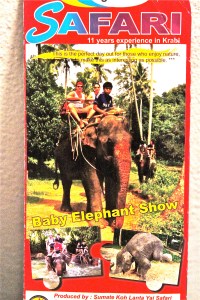
A tourist brochure advertising elephant riding and a baby elephant show that I picked up while in southern Thailand.
On it you see tourists riding an elephant on its back with a mahout, or handler, riding the neck. With a closer look, a large hook can be seen in the mahout’s hand which is used to repeatedly jab sensitive parts of the ears and neck to keep the elephant moving and subservient. The elephants that are in the riding industry, and those that are domesticated in general, seek to do nothing more than satisfy their mahout, as they know the consequences of not doing so. In order to domesticate these giant animals, the elephants are broken through the Phajaan or “crushing ceremony,” a process in which a shaman uses “Black Magic” (but mostly just torture) to separate the wild spirit of the elephant from its body (see below– WARNING this is difficult to watch at times). The process is meant to break the bond between the baby elephant and its mother and force the elephant to fear the mahout. The Phajaan usually happens when the elephant is about four years old and just finishing up its nursing. It is confined to small pen and is repeatedly stabbed with nails, burned, and driven to exhaustion, as it often not allowed to sleep during the roughly one week breaking process. Domination of the animal is made evident, and the torture drives the animals into fear and submission. After the process is complete, the animal seeks to please its mahout and its new fate is sealed.
SIGN a petition on change.org to ban the crushing ceremony in Thailand HERE
When I hear well intentioned people talk about people riding elephants or attending one of the elephant shows, I can only cringe as I know what these animals likely went through to get to that point. At the mercy of man, they are used as a novelty Thai experience. These animals would much rather be checking out the wild banana trees and foraging the mountainside. What I loved about the ENP was the focus on positive treatment of the animals and a big educational piece about the problem of elephant exploitation in Thailand (on the ride to the park a documentary is shown about the park and elephant tourism and another documentary is shown during the visit at the park). Almost all of the elephants at the ENP once served in the tourist or logging industry and had a hellish ride up to being rescued; however, no hooks are used to control the elephants. Instead commands are learned through positive reinforcement and love. Cooperation, not domination, is the goal. (meet the herd HERE)
Sangduen “Lek” Chailert, the founder of the park is a remarkable woman. From a northern Thai hilltribe, she has turned her rescue mission into an alternative tourist attraction to those advertised everywhere throughout Thailand. Visitors to the park are given the opportunity to meet each of the elephants, all of which have names and personalities that are highlighted by the incredibly professional staff. Each of the 31 elephants eats approximately 330-600 pounds of fresh food and drinks 150 liters of water a day! Their appetites have become a boom to agriculture in the struggling local economy around the park. Locals are employed as compassionate mahouts, and money is raised through visitors of ENP to rescue more elephants from the perils the tourist industry sometimes leads to. A few of the elephants are blind, some have suffered broken backs and legs from logging, and many have seen years of abuse driven by long working hours and mankind’s insatiable appetite for a dollar. The park gives visitors the opportunity to feed the elephants multiple times, bathe them in the river flowing through the park, and the animals are more than happy to pose in as many pictures as you want, so long as you pop a banana or pineapple in their mouth. Volunteers can stay at the park for a week to help out with chores and spend more quality time with the elephants. For $400, this seems like an incredible opportunity for fun and work for a great cause! Lunchtime features a wide spread of all vegetarian options— you will definitely not go home hungry or unsatisfied as this meal was fantastic!
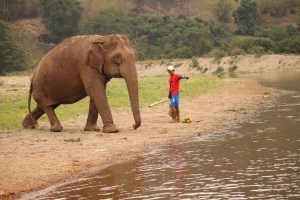
from ENP website: (b. ~1975) Rescued from a trekking camp in early March 2011, there is still much to learn about Tilly’s past. It is known that she has had about 15 owners already. She likely injured her leg when she was working within the illegal logging industry or a forced breeding program. She was bought from a nearby trekking camp and had only been there a few months when ENP rescued her. It is not known exactly what her job was as it is hard to imagine her actually wearing a trekking seat as her spine is considerably peaked and slopes down toward her back end.
During lunch, I noticed a man picking ticks off a three legged dog affectionately named “Stubby” (he had apparently lost his leg when a train ran over it in Bangkok. In addition to housing 31 elephants, the park is also home to over 400 rescued dogs from the recent flooding in Bangkok. Volunteers can stay a minimum of a week FOR FREE to help out with the dog project). I approached the man picking off the ticks and asked if he was a vet volunteering or just someone helping out at the park. After brief introductions, Derek replied saying, “Well, I help out with construction projects, feed management, expansion, and everything in between.” He tagged on the end, “And I am Lek’s husband.” Lek came over shortly after to combine her pile of ticks with Derek’s, as she was off to care for an elephant a few hundred meters away. What I love about this “power couple” is how involved they remain in their organization, even through its expansion and growth in popularity over the years (Lek has been a guest of Hillary Clinton in the White House and publications such as National Geographic have highlighted her work ). It would be easy to hire a few extra people to do these menial tasks, but there they were, loving each animal and treating each one as an individual worthy of respect and care. I chatted with Derek for a good twenty minutes about their rescue program and learned about plans for more rescue sanctuaries in Laos and the ultimate goal to release many elephants back into the wild to live freely. The park isn’t meant to be a permanent spot for these animals, just a stepping-stone. The last thing Lek and Derek want to do is exploit.
In addition to all of the great work they are doing at the park, Derek and Lek along with activists, frequently lobby the government to change antiquated laws regarding these sacred animals. One of the most pressing issues is the current classification of the elephants as livestock, or the equivalent of chickens, pigs, and water buffalo. A different classification would give the elephants better protection and would put the animal’s populations a chance to grow and thrive as they once did in Thailand (a century ago there were nearly 100,000— today the population looms around 5,000 half of which are domestic).
Of Men (and Boys)
I had no idea about the prevalence of elephant exploitation in Thailand until seeing the ENP and hearing the stories of all of the elephants in the park. I cannot help but see the parallels in the world’s misunderstanding of general human exploitation that reeks havoc in Thailand. If you’ve read Nicholas Kristoff’s Half the Sky or any other of the recent field studies done on human trafficking and the sex industry throughout the world, you would be well aware of the exploitation of women, but probably did not read much, if any, mention of the exploitation of men and boys. When I mention that Urban Light’s target population is teenage boys working in the red-light districts of Chiang Mai, I get confused looks and many questions to follow: Does that happen? Is that a real problem? Men aren’t selling themselves are they? And the answer is yes to all of these questions. But it is often ignored and swept under the floor mat by the government and by most NGOs as an untouchable issue. There are lots of organizations working for women and girls, but very few, if any, work with boys and men in similar situations. Funding for non-profits doing what we do is often limited, and I admire the work Alezandra has done to secure donors for the important work we are doing. (If you would like to make a donation or learn more about Urban Light, please visit our website at www.urban-light.org). She tirelessly tours the USA and world spreading awareness that gives hope to our boys struggling to get out of the day in and day out they experience.
One of the main problems surrounding awareness of male exploitation is that very few people are researching it. Field studies are far and few between and information regarding this growing problem is just now coming to the surface. Urban Light is happy to be, as of this week, hosting a researcher, my new room mate, from the great organization Love146 who, over the next two months, will be looking at the state of male prostitution and exploitation throughout Chiang Mai, interviewing male masseurs, street workers, and boys at the “boy bars”.
This important research will give local NGOs and governments (including the United Nations) a better idea of resource allocation and where programs can be most effective. I am really looking forward to being involved in this important study as I know the results will be invaluable to the population we are trying to serve.
Awareness
I know most people coming to Thailand are not looking to support the sex industry or to intentionally exploit animals, but we all need to be aware of such things in order to be more positive tourists and perhaps activists when we go home. I can’t help but notice the parallels between the elephants I visited at the Elephant Nature Park and the pain I am sure most of our boys have been through in their lives— but there is a bright side to things. Though those elephants and our boys have been to hell and back, they have a space where they can be themselves and be safe. Being provided love and support is what will all desire as humans, and care a respect can go a long way in taming the temper or torment of even the largest creature. Having worked at Urban Light full time for only two weeks now, I can see the impact we are having in these boys’ lives. Three of our boys just got new jobs this past week and are on the road to being more independent and supported by a positive and safe work environment. When the boys come to our center, they have a place to be kids and be treated with respect, not as a commodity or something that can be bought. Whether it’s through a game of UNO or a guitar lesson, I can see their faces light up with the enjoyment and love for life outside the doldrums of the night.
My love for science has been reinvigorated as I teach the boys about processes happening around them daily: how and why a plant makes fruit, photosynthesis, weather, the reason for seasons. A group of rowdy boys is calmed by their interest in these subjects and it’s fun to ask questions and hear their inquisitiveness in each subject taught. These kids are SO smart— they just haven’t been given the opportunity to education that many of us in the states take for granted. Two weeks in at Urban Light and I feel there is a lot more great stuff I can contribute to the organization. The ride has just begun but I know it is going to go really fast but whatever impact I can make, I will put my foot forward towards.
So next time you think of Thailand remember the issues that are here. It’s hard to throw out everything the media tells us, but I encourage everyone to always keep there eyes and ears open to the realities that exist and not take for granted what you might hear. Don’t let those cockroaches slip into the cracks as these problems and our awareness often does. Stay informed, tell a friend, and together we’ll make this world a better place.






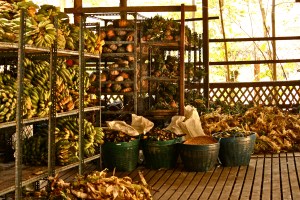
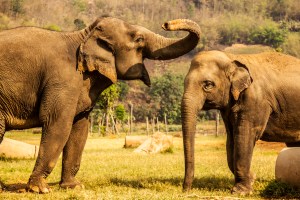
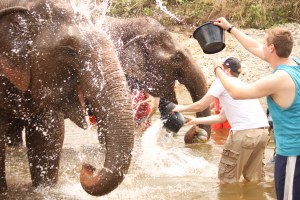
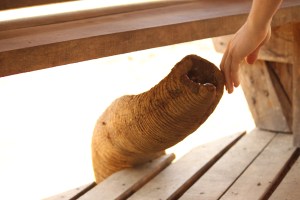
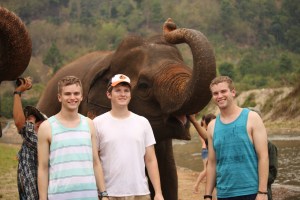

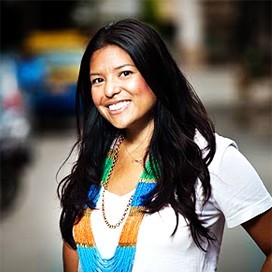


Man such amazing words, pictures, and videos… I’m glad you Darryl and Scott all got to experience the ENP together. It’s crazy how we as humans think we have a monopoly on “intelligence.” Often I wish I had the will power to be a vegetarian. – Nick
Thanks for reading! I went veg for a few months at the beginning of the year and it was definitely a challenge but good experience. There is so much food out there to try and changing my diet opened me up to lots of great new stuff. I hope all is well!
Great post and so glad you discovered ENP. I will be in Thailand next month with my family, and after lots of elephant research myself, learned about the horrible treatment of elephants. It took some effort to convince my husband that elephant rides and shows are actually a bad thing, but my kids understood instantly. We are going to ENP for a day visit (thought I’d like to go back and volunteer for a week or longer.) I wrote this blog about our family’s decision not to ride elephants, http://mynextbigadventure.com/2013/04/02/why-our-family-wont-be-riding-elephants-in-thailand/. We can’t wait to see the herd at ENP! Enjoy your adventure!
You won’t regret your decision to visit the park! I’m so happy you stayed persistent with your husband, and I am excited for you to volunteer there as well! Thanks for reading!
Elliot this is absolutely incredible. What a fantastic journey you’ve embarked on! I’m really looking forward to reading your blog.
thanks for stopping by =) I hope all is well!
Elliot, I am glad you are doing well and putting your soul into some incredibly worthy causes. Baltimore misses you!
Best,
Sheila
And I miss Baltimore! Thanks for checking out the blog. It’s a privilege and pleasure to be able to do this work and I am so fortunate to have the means to do so. Eat some crabs for me! =)